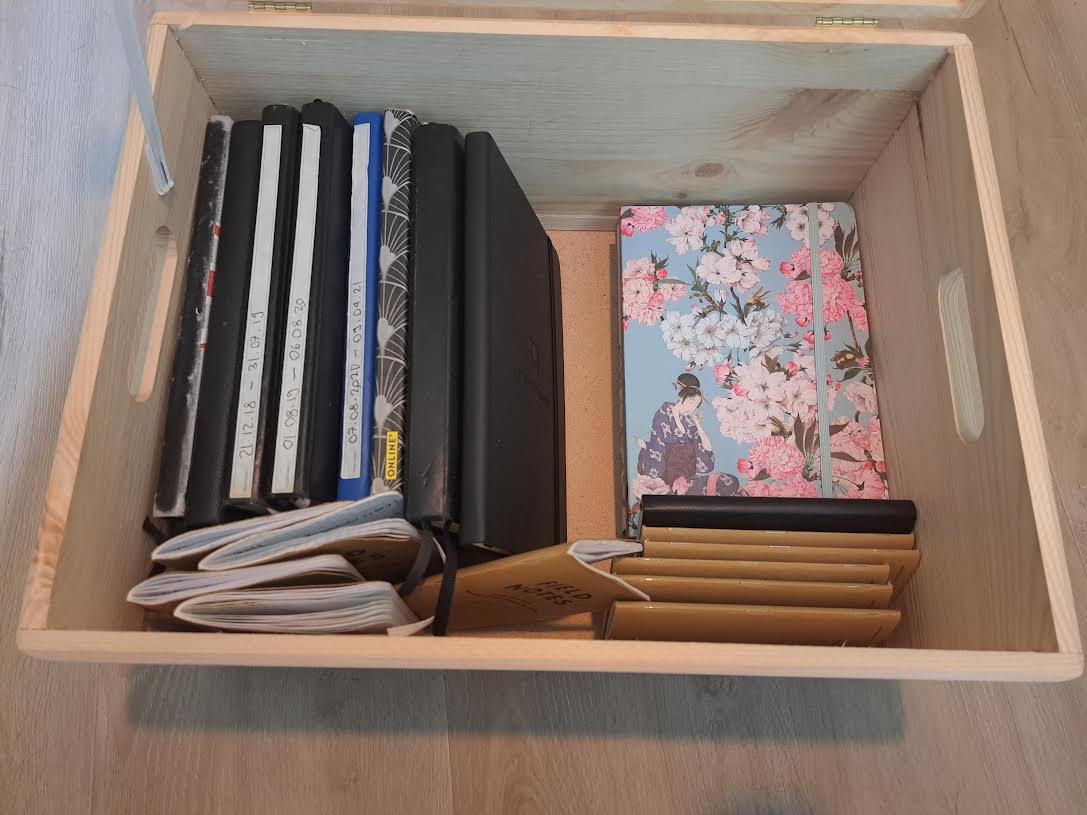
Incoming
Lots of new information reaches me daily over many different channels. Somebody taps my shoulder at work, I hear something cool in a podcast, get an email, slack message, SMS, read the news, etc.
It’s simply not possible to act on all this information straight away since a day only has 8 hours. To keep focus on what matters at the moment and still archive the new information for later, I rely on two kinds of tools that I’d like to share with you.
Analogue tools in a digital world

For almost five years now I’ve been journaling daily. I use pen and paper and follow Ryder Carroll’s Bullet Journal method pretty closely.
The great thing about pen and paper for me is that it’s very hard to delete things. If you wrote down a thought, an idea or something the like it will stay there. It’s your unfiltered, unedited, raw thought. You can’t go back a day later and change your initial feelings to be more polite or charming.
I love the journals to just scribble down everything that comes to mind, everything that comes in over different channels. Because when they’re in my journal, they’re out of my mind.
There is one problem with pen and paper though: It’s really hard to search for stuff. That’s where the digital tools come in handy.
Other tools
In the past couple of years I’ve used notion as my main digital productivity tool. It’s great! I still can’t believe it’s free for all the features it provides.
I still use my journal as a kind of “inbox” and at the end of the day or after lunch I usually migrate things to notion. The main entities I have in my org tool are
- Goals: defining goals I want to reach in a given period
- Todo backlog: things I want to do at some point. For example: books to read, project ideas, blogposts to write, …
- Projects: things I’m building and working on like my toy operating system LonelyOS
- Log: a page to log things on a daily basis. links, ideas, code snippets and the like in a very loose unorganized fashion
LonelyOrg
The recent blogpost on Hey about leaving the post inspired me to rely on the cloud less. What happens if notion is down? Out of business? The cloud they rely on is down? I could no longer access my organizing tools. Unacceptable.
I use fish as my shell and my systems are always set up in a way that lets me access a shell anywhere in 2 keystrokes (e.g. CMD + Enter). My fish config has the following section for organizing things:
# setup org
set -x ORGDIR ~/org
# todos
function t
nvim "$ORGDIR/todos/$argv.md"
end
alias tls="ls -al $ORGDIR/todos/*.md"
function trm
mv "$ORGDIR/todos/$argv.md" "$ORGDIR/todos/done/$argv.md"
end
# projects
function p
nvim "$ORGDIR/projects/$argv.md"
end
alias pls="ls -al $ORGDIR/projects/*.md"
# logs
function l
nvim -p "$ORGDIR/logs/$(date +"%Y_%m_%d").md"
end
# org
function org
echo "l -- open the daily log"
echo "t -- add/edit todo"
echo "trm -- close todo"
echo "tls -- list todos"
echo "p -- add/edit project"
echo "pls -- list projects"
end
So, I can open my sehll and simply type org to get an overview:
$ org
l -- open the daily log
t -- add/edit todo
trm -- close todo
tls -- list todos
p -- add/edit project
pls -- list projects
All you need to to is set up your ORGDIR with directories for logs, goals, projects, and todos and you’re good to go. The daily log is my favorite feature so far. The l command will open (n)vim in the logs directory and create or modify a file named after the current date. So you can just scriobble down daily todos, learnings, code snippets or anything you like as you go.
To share the org over multiple laptops, PCs, etc I simply created a git repository from my org directory.
I’d love to hear how you organize your things and how they differ from the system outlined above!
so long
comments powered by Disqus